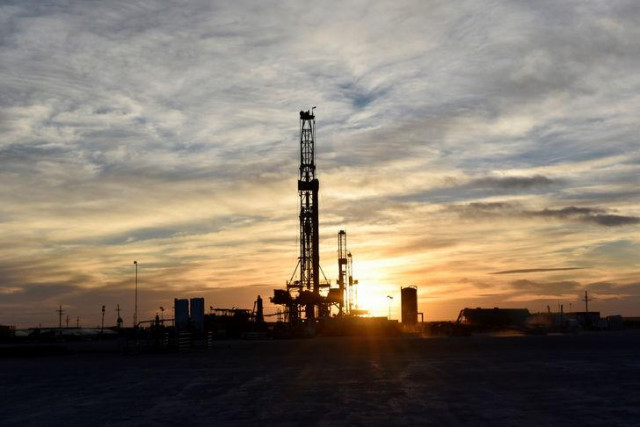Oil falls 3% as Saudi Arabia, UAE plan for higher output capacity
Prices climbed $2 earlier on hopes that spending cuts by North American producers would lead to a drop in output

Prices climbed $2 earlier in the session on hopes that spending cuts by North American producers would lead to a drop in output. PHOTO: REUTERS
Brent crude was down $1.09 or almost 3% to $36.13 per barrel by 1221 GMT, while US West Texas Intermediate (WTI) crude was off $1.06 or 3.1% at $33.30.
With the collapse of coordinated output cuts by Saudi Arabia, Russia and others, the Saudi energy ministry has directed producer Saudi Aramco to raise its output capacity to 13 million from 12 million barrels per day (bpd).
UAE national oil company Adnoc also said it would raise crude supply to more than 4 million bpd in April and accelerate plans to boost its output capacity to 5 million bpd, a target it previously planned to achieve by 2030.
"Saudi's shock and awe strategy suggests to us that to bring Russia back to the negotiating table, it is serious in causing severe price and revenue pain for all oil producers," UBS analysts said in a note. "Higher oil inventories will likely weigh on prices over the coming months."
Russian Energy Minister Alexander Novak said Saudi Arabia's plans to increase production capacity were "probably not the best option", adding Moscow had several phone calls with OPEC and non-OPEC members but that no partners had agreed to its proposal.
Tanker rates soared after Saudi Arabia's national shipping firm, Bahri, tentatively chartered 14 supertankers to ship crude oil to customers worldwide.
Oil prices had climbed $2 earlier in the session on hopes that spending cuts by North American producers to cope with multi-year low crude prices would lead to a drop in output.
"Any reduction in spending and drilling will take time to show up in actual production figures and is unlikely to mitigate the bearish impact of a massive Saudi output increase, in case the latter does happen," said oil broker PVM's Tamas Varga.
Policymakers and central banks have been taking measures to bolster their economies against disruption caused by the coronavirus outbreak, the latest being the Bank of England which unexpectedly cut interest rates by half a per cent on Wednesday.
"Oil's supply-demand dynamics still point to a bias for weakness, as Saudi Arabia and Russia engage in a price war that threatens to push global markets into oversupplied conditions, at a time when global demand is being eroded by the coronavirus outbreak," Han Tan, market analyst at FXTM.
A worker at Equinor's Martin Linge offshore oil and gas development has been diagnosed with the coronavirus and is being held in isolation, the Norwegian energy firm said. It said activity on the field will be reduced on Wednesday.
However, China's independent oil refiners are cranking up production as local governments begin to relax strict measures to contain the coronavirus and fuel demand begins to recover.


















COMMENTS
Comments are moderated and generally will be posted if they are on-topic and not abusive.
For more information, please see our Comments FAQ